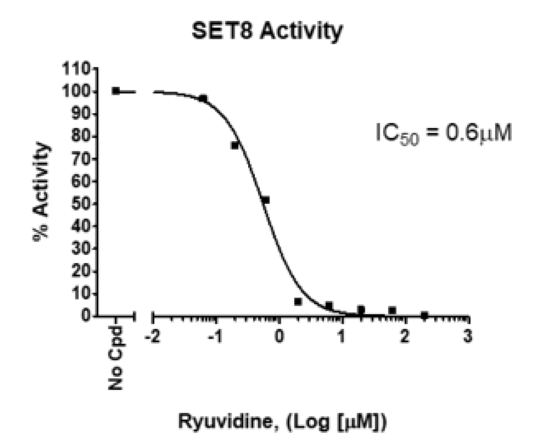Set8 Chemiluminescent Assay Kit
The Set8 Chemiluminescent Assay Kit is an ELISA (enzyme-linked immunosorbent assay)-based assay designed to measure the histone methylase activity of Set8 (SET domain containing lysine methyltransferase 8) for screening and profiling applications. The Set8 assay kit comes in a convenient 96-well format, with enough recombinant purified Set8 enzyme (amino acids 195-252), substrate, antibodies, and all the reagents necessary for detection.
Need us to run inhibitor screens or profile your compounds against Set8? Check out our Methyltransferase Screening Services.
- TBST Buffer (1x Tris-buffered saline, pH 8, containing 0.05% Tween-20)
- Luminometer or microplate reader capable of reading chemiluminescence
- Adjustable micropipettor and sterile tips
- Rotating or rocker platform
| Catalog # | Name | Amount | Storage |
| 51008 | Set8, Active, GST-Tag* | 90 µg | -80°C |
| 52120 | 400 µM S-adenosylmethionine |
4 x 250 µl | -80°C |
| 52190 | 4x HMT Buffer 4 | 3 ml | -20°C |
| Primary Antibody 23 | 12.5 µl | -80°C | |
| 52131H | Secondary HRP-Labeled Antibody 2 | 10 µl | -80°C |
| 52100 | Blocking Buffer 4 | 50 ml | +4°C |
| 0.5M DTT | 2 x 200 µl | -20°C | |
| 79670 | ELISA ECL Substrate A (translucent bottle) | 6 ml | +4°C |
| ELISA ECL Substrate B (brown bottle) | 6 ml | +4°C | |
| White plate (or strips) pre-coated with Histone-Substrate | 1 plate | Room Temp |
*The concentration of the protein is lot-specific and will be indicated on the tube.
SET8 (PR/SET domain containing protein 8), also known as KMT5A (lysine-specific methylates 5A), belongs to the family of proteins that contain an SET domain. It has the specificity of being the only protein that monomethylates H4K20me1, but also participates in monomethylating proteins like p53 and PCNA (proliferating cell nuclear antigen). It is involved in cell cycle regulation and DNA replication and repair. Abnormal expression of SET8 can lead to cancer, and this protein is found at high levels in several cancers, such as breast cancer. Inhibition of SET8 was found to increase cancer cell sensitivity to radiotherapy. The use of inhibitors alone or in combinatory therapy promises to bring benefits in cancer therapy.
Pan D., et al., 2022 Biomed Environ Sci 35(3), 194:205


